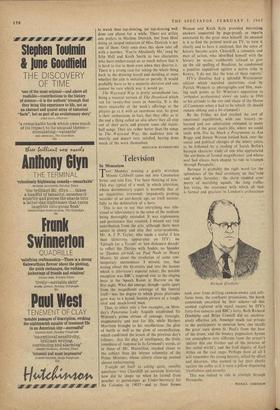Television
In Memoriam rr Eva Monday evening a gently wretched 1 Minnie Caldwell came out into Coronation Street and told Ena, 'I've been thinking of him.' This was typical of a week in which television, whose documentary aspect is normally that of an inquisitive, irreverent, impudently probing recorder of an anti-heroic age, set itself success- fully to the delineation of a hero.
This is not to say that everything was tele- visual or televisionary in the sense of the medium being thoroughly extended. It was copiousness and persistence that counted. I missed any real contribution from the arts, although there were actors in plenty and also that actor-academic, Mr. A. J. P. Taylor, who made a useful if less than idolatrous appearance on ITV: no 'Epitaph for a Tyrant' or 'low dishonest decade' to reflect the Thirties with Auden, no Spender or Thomas air-raid, no Paul Nash or Henry Moore, let alone the revelation of some con- temporary masterpiece. I missed, too, that nosing about the by-streets and into the houses which is television's especial talent; the notable exception was BBC's inspired visit to the singing boys in the Speech Room at Harrow on the first night. What did emerge, though—quite apart from the magnificent coverage of the funeral itself—was the degree to which pious platitudes gave way to a broad, human picture of a tough, vital and much-loved man.
Thus, to select only a few examples, on Mon- day's Panorama Lady Asquith established Sir Winston's prime virtues of courage, foresight, magnanimity and zest for life, while Herbert Morrison brought to his recollections the glint of battle as well as the glow of reconciliation, which confirmed the lesson of the previous day's tributes: that the play of intelligence, the lively roundness of response in Jo Grimond's words, or in those of Mr. Macmillan, reached closer to the subject than the intense solemnity of the Prime Minister, whose silvery close-up seemed almost embarrassing.
Tonight set itself to • asking quiet, sensible questions—was Churchill an accurate historian, how did he shape up when he turned from poacher to gamekeeper as Under-Secretary for the Colonies in 1905?—and to these Steven
Watson and Keith Kyle provided interesting answers supported by page-proofs or reports annotated by the great man himself. So unusual is it to find the printed word on TV, to view it clearly and to have it analysed, that the sense of history became acute. Churchill, a romantic and man of action, who identified himself with the history he wrote, stubbornly refused to give up the old spelling of Boadicea; he condemned a punitive expedition against a native tribe in Kenya, 'I do not like the tone of these reports.'
ITV's Dateline had a splendid Westminster edition which matched quotations read by Patriek Wymark to photographs and film, mak- ing such points as Sir Winston's opposition to 'orthodox professional views' on tanks in 1916 or his attitude to the size and shape of the House of Commons when it had to be rebuilt. (It should remain oblong and a bit cramped.) By the Friday we had reached the sort of emotional equilibrium, with our history re- learned and our admiration extended to many periods of the great man's life, where we could smile with Not So Much a Programme as Asa Briggs and Steven Watson looked back over the social and political changes of the ninety years, to be followed by a reading of Isaiah Berlin's baroque character study of one who appreciated 'the attributes of formal magnificence' and whose soul had always been shaped `to ride in triumph. through Persepolis.'
Baroque is probably the right word for the splendours of the final ceremony on tharcoldi and windy Saturday: the sharp studded sym-' metry of marching squads, the long traffic• less vistas, the assurance with which all that is formal and gracious in London's architecture
took over from drifting cannon-smoke and soft- focus trees, the confluent processions, the harsh commands smoothed by their echoes—all this seemed captured with equal success by ITV's forty-five cameras and BBC's forty. Both Richard Dimbleby and Brian Connell did an unobtru- sively effective job. Amongst much too private to the participants to mention here, one recalls the great view down St. Paul's from the base of the drum, and the bouncy pugnacious hymns (an atmosphere very different from the prayer's 'deliver this our brother out of the miseries of this sinful world'), and the frail dignity of Earl Attlee on the vast steps. Perhaps most of all I will remember the young bearers, stilled• by effort and decorum, who seemed to lay their cheeks against the coffin as if it were a pillow dispensing trustfulness and serenity.
PATRICK ANDERSON


































 Previous page
Previous page